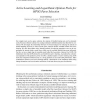Free Online Productivity Tools
i2Speak
i2Symbol
i2OCR
iTex2Img
iWeb2Print
iWeb2Shot
i2Type
iPdf2Split
iPdf2Merge
i2Bopomofo
i2Arabic
i2Style
i2Image
i2PDF
iLatex2Rtf
Sci2ools
101
click to vote
NLE
2008
2008
Active learning and logarithmic opinion pools for HPSG parse selection
For complex tasks such as parse selection, the creation of labelled training sets can be extremely costly. Resource-efficient schemes for creating informative labelled material must therefore be considered. We investigate the relationship between two broad strategies for reducing the amount of manual labelling necessary to train accurate parse selection models: ensemble models and active learning. We show that popular active learning methods for reducing annotation costs can be outperformed by instead using a model class which uses the available labelled data more efficiently. For this, we use a simple type of ensemble model called the Logarithmic Opinion Pool (LOP). We furthermore show that LOPs themselves can benefit from active learning. As predicted by a theoretical explanation of the predictive power of LOPs, a detailed analysis of active learning using LOPs shows that component model diversity is a strong predictor of successful LOP performance. Other contributions include a nov...
| Added | 14 Dec 2010 |
| Updated | 14 Dec 2010 |
| Type | Journal |
| Year | 2008 |
| Where | NLE |
| Authors | Jason Baldridge, Miles Osborne |
Comments (0)

